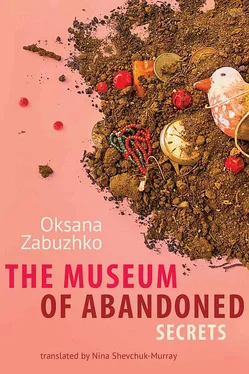And this is just the beginning, Lord. Just the beginning.
Apollinaria, Stefania, Ambroziy, Volodymyra. (How comical these cloche hats from the Jazz Age of the already-past century: these tightly fitted little felt pots, pulled down to just above the eyebrows and banded with silk—you know it’s silk because it glistens even in the prints—with tiny brims and round tops; and the women’s legs, always in stockings, even in summer. Just think how they must’ve sweated, poor things.) To shuffle the photos is to greet each one of them silently with my eyes, despite the fact that they’re all long dead. I’m the one poorer for it.
It’s not just me looking at them—they do look back. I realize this in an instant (I couldn’t possibly explain this, even to you!) with the same precise and inexplicable certainty as I did one day, many years ago, at St. Sophia Cathedral when I had wandered in, lathered after a half-sleepless night, agitated not so much by any real events but by the much more deeply disturbing premonition of fundamental changes in my life—changes whose advance I could feel from all sides at once and which I knew portended the end of my youth.
The ticket office had just opened and I was the first visitor, all alone in the echoing and alert silence of the temple, where every step on the terrifying cast-iron floors rang all the way through the choir lofts. I stood at the bottom of the honey-thick twilight suspended in half-consciousness by a swirling, tilting pillar of sunlit dust until I suddenly felt a thrust at my chest: from a fresco on the opposite wall of a side nave, a white-bearded man in a blue, richly draped, floor-length cloak looked at me, his dry, walnut-colored palms pressed together. I felt faint—a soft, furry paw brushed me from inside—a shaky shard of a vision slashed through the air. Something stirred. I stepped closer but the man—this monk or statesman with the time-darkened face and those clearly drawn, typically Ukrainian contours that are also soft like the lines of aging mountains and that one still recognizes, so easily, in the faces of the men at the Besarabsky Market—was already looking at something else. Only the eyes—implacably dark and swollen with knowledge—burdened his face, as if not given quite enough room, and it seemed they would turn upon me again at any moment. I couldn’t stand it and looked away first, and it was then that I saw what I had never noticed before, as if helped by a sudden shift of light: the cathedral was alive, it teemed with people—every wall and arch was inhabited with dimly silent, time-smudged women and men, and every one of them had the same otherworldly eyes, pregnant with the ecclesiastical pall of all-knowing.
All these eyes saw me. I stood there in view of a crowd, only it was not a crowd of strangers. They took me in with such kindness and understanding, as if they knew everything about me, so much more than I could ever know myself, and as I slowly dissolved—like a pat of butter in warm water—in their encircling gaze (I couldn’t tell how long this lasted, time had stopped), it was suddenly revealed to me as the most obvious thing in the world that these people did not just live a thousand years ago ; they had lived for a thousand years, taking in everything that had passed before their eyes until their gaze held the quintessence of time—the heavy slow suspension of a millennium, clots and crystals of time squeezed together like tightly pressed atomic nuclei. And I was before them, a mortal, barely nineteen. I wasn’t even a woman yet to tell the truth (it was soon after that I became one), so perhaps mine was the kind of revelation classified in theological literature as a maiden’s vision or some such. At any rate, never again, in any of the ancient holy places—not at the Athenian Parthenon, nor on the bare site of the Jerusalem Temple, nor in the Garden of Gethsemane—would those, visible or invisible, who persist in a place for ages, welcome me as one of their own. All I ever felt again—even when I managed to be alone with them—was their purposeful wariness, not menacing or defiant but more akin to a held breath, a whisper: What do you want, woman?
I must admit they have a point. Indeed, what business do I have with them? Having once accepted a man, a woman passes irretrievably into a different gravitational field—she simply falls into time, into a silt-clogged stream, falls with the entire weight of her earthly body, with her uterus and ovaries, these living chronometers. And time begins to flow through her, no longer pure (for when pure it does not flow at all, it stands still, like that day at St. Sophia; it is a single lake, a placid spill of the radiant dark-honeyed twilight) but em bodied as she is in her clan—her kin—in the endless chromosomal rosary of the dying and resurrecting genotype that pulses with mortal flesh into that which we call—for lack of a more accurate term—human history, every one of us plugged into a serial circuit and once in, you cannot jump out, you cannot see the whole thing from outside. Unless you’re a nun—but it’s too late for me now.
And so now I don’t know what I’m supposed to do with this new feeling. They look at me from these old photos as if I owe them something—I shrink and shy in their heavy gaze that reaches so far beyond the moment captured by the camera, unsure about what it is they expect of me. It’s as if they don’t know if they can trust me, like they need to size me up, to see if I am good enough for the family, how serious my intentions really are. (Good Lord, what nonsense am I thinking?!) These women with their cloche hats and their thighs sheathed in sun-spotted Jazz-Age dresses (it is a clear summer day, and there are trees in the background that might still be growing in the same spot, and a dog, his tongue wearily lolling from his mouth) and their buttoned-up, sporty-looking boys in turtlenecks and breeches, and men with black moustaches like butterfly wings above their lips, later called Hitler moustaches (but Hitler hadn’t yet come to power, and across the Zbruch River no one had yet stacked mummified-alive corpses like hay, and Lemyk hadn’t shot Consul Mailov, and Matseiko hadn’t taken aim at Minister Pieracki…).
And then here are those after the war, in incomparably poorer rags, who managed to live despite it all, the remainers , or better, the survivors , meaning the nonetheless living. (Which sounds so much kinder, doesn’t it?) And here is a tiny snapshot after the deportation, with oppressive, low-slung volcanoes on the horizon (Kolyma? Transbaikal?), and the boy in the foreground is struck with a completely different leanness, not the athletic kind but the thoroughly plebeian, hunger-worn kind. He wears a baggy jacket with hideously padded Terminator shoulders, and so does the young woman with poodle-like curls next to him. Both are laughing into the camera; their heads are close together yet their hands are behind their backs, as if still under the armed guards’ command, but laughing joyfully nonetheless, laughing from their hearts—their entire beings so happy about something. What is it, one wonders, that could make them so happy there?
Something painfully familiar flashes in the tight ripples around the man’s mouth, like déjà vu or a dream you can’t recall in the morning. I must have seen this same expression in your face, must have caught its fleeting, uncanny breath on your features, gone in an instant without a trace, a message from a long-gone soul who has only this one way of reminding us about himself—and if I look carefully (What exactly do you imagine I’ve been doing here all this time, gulping down eyeful after eyeful?), I can find something of yours in many of these faces, something imperceptibly altered but shared nonetheless, as if an errant beam of an invisible torchlight, dancing over them, flashed you out of an accidental fold of another’s features or in a turn of another’s head. Here, here it is; it almost coheres but again merely almost, and the dream of unrecognition goes on, growing slowly more nightmarish, as if now I am chasing a fleeing ghost.
Читать дальше












